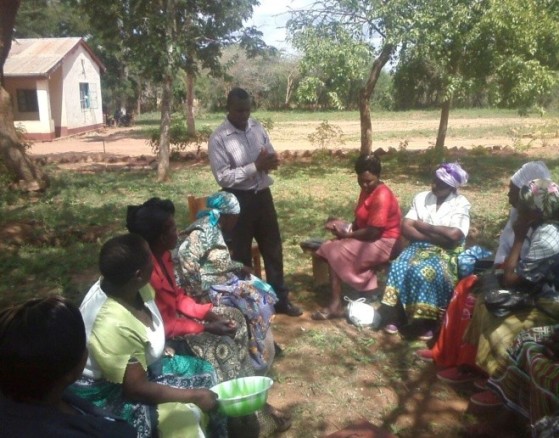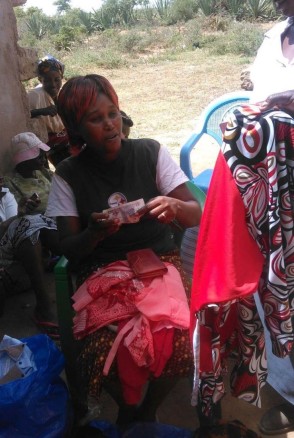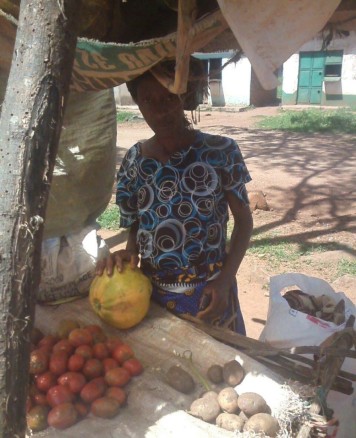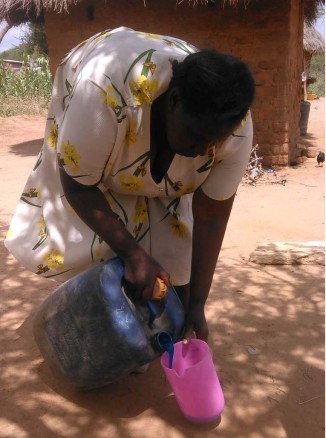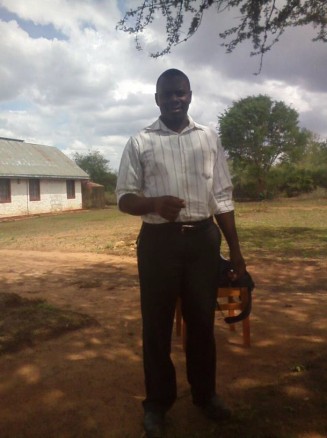
Visit a village in Kenya
Join 400 villagers from one of Kenya’s poorest regions as they climb from subsistence to success
In April 2014, thanks to a generous US $49,000 donation from Swedish investment company Dieden Invest, Hand in Hand embarked on a two-year mission to transform the community of Kithimani, Machakos, by deploying our job creation model on a village-wide scale. This page tracked its progress.
About Kithimani
Kithimani is in Machakos, an inland county with beautiful hilly scenery well suited to hiking safaris. The county is home to the Ol Donyo Sabuk National Park, with spectacular views, wildlife and some 45 species of birds.
Step off the tourist trail, though, and the view is far less resplendent. Here in rural Kenya, 49 percent of people live in poverty. Two-thirds lack access to sanitation facilities. Almost 50 percent lack access to clean water. And medical care is vanishingly rare: according to the International Fund for Agricultural Development, there is only one doctor for every 10,000 people. (This short article gives an excellent overview of inequality in Kenya.)
The plan
Members trained
To provide business and skills training to 400 Kithimani villagers
Jobs created
Business owners employ their neighbours. An estimated 350 jobs were to result from the programme
Lives improved
Every business we helped create in Kithimani benefited an average of five family members – young, old and everywhere in between. We planned to lift 1,250 children and adults out of poverty
The challenge
Most houses in Kithimani are built of mud and corrugated iron sheets. The surrounding area is generally dry and rugged. The rains did not come in 2014 and maize, beans and pea crops dried up. This forced many of the people of Kithimani to rely on government relief.
The villagers do not have access to water on tap. Women and children spend hours every day retrieving for water. Polluted water affects their health, causing children to miss many school hours. As the parents lack consistent income, they are unable to pay secondary school fees forcing children to drop out of school.
Nothing like Hand in Hand Eastern Africa’s Village Programme had ever been tried in Kithimani before, but that’s precisely why local leaders – county officials, church ministers and the like – welcomed us into their community. It was their co-operation that enabled us to work effectively.
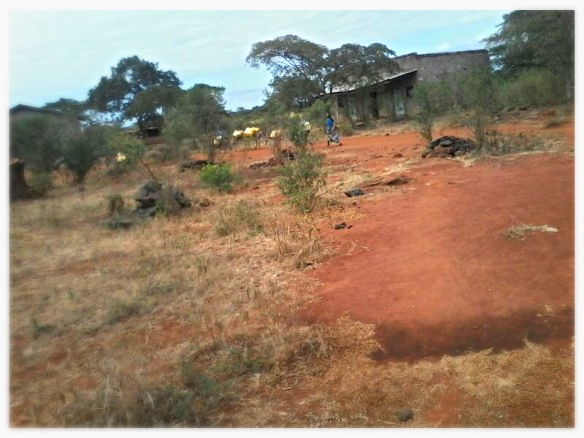
Khitimani village | Machakos county, Kenya
The results
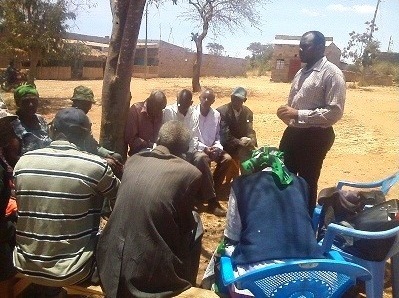
Business Relationship Officer Kelvin Mulwa trains a group in Kithimani
Two years after Hand in Hand arrived in Kithimani with a pledge to help hundreds of micro-entrepreneurs work their own way out of poverty, the programme has concluded. Kelvin Mulwa, the Business Relationship Officer tasked with training 400 villagers, reflects on the project.
“It’s been a pleasure to watch the members grow from timid housewives or subsistence farmers to confident entrepreneurs. Many of them joined the training doubtful of their own abilities and confused by the fact that Hand in Hand wasn’t going to give them a ‘hand-out’ like other organisations have done in the past. Watching them improve their businesses on their own and seeing their belief in themselves grow has been very rewarding,” he says.
“Imagine not knowing if you will grow enough vegetables or sell enough eggs to feed your family this week, or having to worry that you won’t be able to afford medicine if your child gets sick this year. These are everyday struggles for Kithimani’s residents. They had the willpower and strength of mind to carry on and today they are much more in control of their wellbeing and future.”
By the numbers
Member, business and jobs targets were exceeded. Overall, the project aimed to improve the lives of some 1,250 hundred Kithimanis – a number based on the average Kenyan family size of five. Final data show the programme improved 1,300 improved lives.
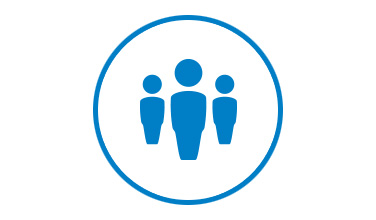
Members trained: 429
Target: 400
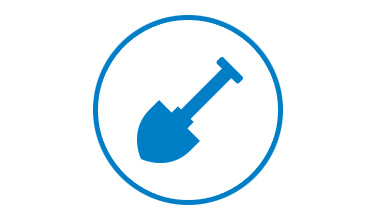
Jobs created: 408
Target: 350
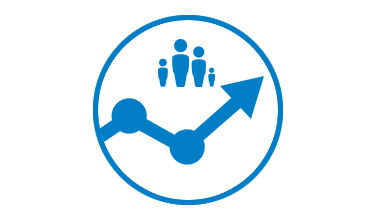
Lives improved: 1,291
Target: 1,250
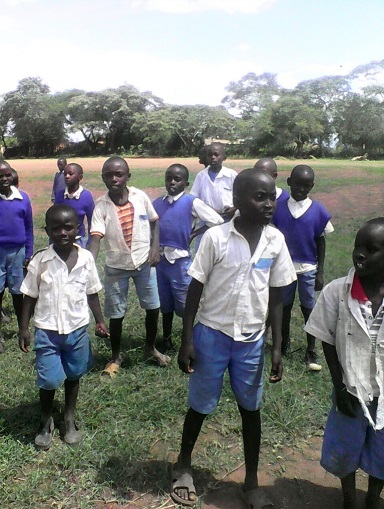
Kithimani Schoolchildren
Once surviving, now thriving
Two years ago the people of Kithimani were subsistence farmers. Today they run profitable businesses growing maize, beans, oranges and mangoes; rearing chickens, goats and sheep; or running groceries and other shops. The money they earn is the difference between going to bed hungry and feeding their families three healthy meals a day, or watching their children crash out of school early versus paying secondary schools fees they previously couldn’t afford.
But the transformation hasn’t stopped in the home. Kithimani’s entrepreneur class is hiring its neighbours and boosting the local economy through increased spending. It’s also putting money aside at unprecedented rates, with average annual savings among Hand in Hand trainees topping US $100. Poor yields and unexpected hospital bills will never disappear in rural Kenya, but for the people of Kithimani, at least, the threat they pose will no longer be existential.
Voices from the community
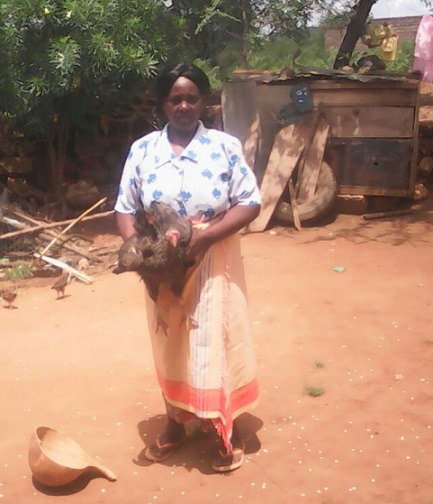
Magdalene at home
Magdalene, poultry farmer and vegetable shop owner
Two years ago, Magdalene was a housewife with a small kiosk outside her home. Her monthly income was just US $20 a month, barely enough to feed her family one basic meal of maize and vegetables every day. Today, after completing Hand in Hand’s training, she earns US $150 a month rearing chickens and selling vegetables from her expanded shop.
“The training has given me skills, but most importantly it has changed my attitude. Today, my customers come from all over the village and beyond. I even use my mobile phone to secure orders for eggs and chickens from small hotels in the area. When before I would struggle to earn any income at all in the dry season, now that I have diversified beyond vegetables and fruit, I earn money all year round,” she says.
“I choose to spend my income on my children’s school fees to make sure they grow up to be responsible and successful people.”
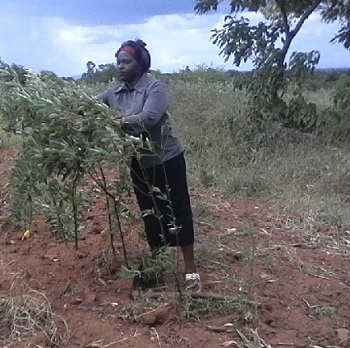
Stella on her farm
Stella, farmer
“When Kelvin told me that farming can be a profitable business I did not believe him! Hand in Hand opened my eyes and suddenly I could see so many untapped resources which I could turn into a business.
“Now that I farm vegetables and rear chickens, I earn around Ksh 12,000 (USD $112) as profit a month. I also employ two part-time workers from my community to tend to my farm and deliver my produce to market. I am lucky that my daughter can now go to a private school. This means she doesn’t miss out on learning because teachers in private school don’t strike like they do in the public schools.”
What happens next
The limited duration of Hand in Hand’s programmes is a defining characteristic of our work. Our aim is to help members help themselves, empowering them to break the cycle of dependency through their own nous and hard work. And so, after two years, we say goodbye.
At this point, we’re no longer needed.
More than 90 percent of members have started businesses that employ at least one person for at least 24 hours a week. Group leaders have the skills and confidence to tap markets outside Kithimani without Kelvin’s support. And a Village Development Committee (pictured) has been established to support members’ continued development.
But if the people of Kithimani have worked their way from subsistence to success, millions more in villages across Kenya could still benefit from our training. To learn more about how you can help, please contact Joe Dyson (details below).
You already know Kelvin Mulwa, the trainer supporting Kithimani, from our last two updates. Kelvin says his “most memorable and humbling experience was at the end of last year, when members were sharing the dividends from the group’s revolving fund. I could see the joy in the members’ eyes as each member got his or her share. This made me proud of the work I had done.”
By the numbers
One year in, nine groups have been mobilised, comprising 192 of the 400 villagers we plan to reach; 176 are women and 16 are men. Together they support 509 children. Groups meet every two weeks, and 164 women have completed the first module of our training, learning how to run their groups and manage collective savings. Every group keeps minutes of their meetings and a cash register to track their savings. These are the tools that will ensure they continue to save and thrive long after the support has ended.
The second module, ‘savings training’, has been completed by 148 members, all of whom have started to save. At the moment their personal savings are low, ranging from 200 KES (US $2) to KES 14,000 (US $16). This is the first time many have set money aside, given that most must provide for four children or more on an average income of US $2.30 a day.
The power of learning
Most members (124 out of 192) in Kithimani have a maximum four years of education. The support they receive provides a once-in-a-lifetime opportunity to catch up on the skills they need to break the cycle of poverty and improve their children’s future opportunities.
The third module, ‘enterprise training’, is being completed by 129 villagers. Lessons include how to earn money from pre-existing skills or assets, how to differentiate oneself from the competition, how to set prices and more.
Former CEO of Microsoft Steve Ballmer famously said, “what gets measured gets done”. This applies to Kithimani’s aspiring business owners every bit as much as it does to the world’s biggest companies. Seventy-six members have already moved on to the fourth module, ‘financial skills training’, where they are learning basic bookkeeping. This skill enables them to manage their costs, separate their household expenses from their business costs and calculate whether they’re making a profit.
Voices from the village program
Rhoda Munywoki (left) started a greengrocer selling produce to the local community. After completing all four training modules, Rhoda said: “Since I started keeping records in my business, I have seen tremendous change. Now I can account for every cost incurred in my business and I know how much return it is producing. With the records I keep, I can plan much better than before. It’s made me realize that I need to sell a greater variety of fruits to increase my income.”
Mercy Wambua (right) sells detergents. “In the past six months I have learned how to manage my debts,” she says. ‘I started selling liquid soap in my village and that has been a great second income. I want to start supplying detergents to the secondary schools around the village to increase my sales.”
What’s next?
Kelvin has a busy 12 months ahead of him. First he must recruit the remaining 208 members, then graduate all 400 from Hand in Hand’s ‘grassroots MBA’. Criss-crossing the dust roads on his motorbike, Kelvin will ensure every member acquires the vital business and financial skills they need, including how to market their products beyond their neighbourhood.
In a poor village like Kithimani, businesses can never grow past a certain level. That is why we aim to equip the women and men and of Kithimani with the means to secure larger sales in neighbouring Matuu, the largest town in the vicinity.
Voices from the village program
By the numbers
Six months into the project, we’ve mobilised six groups comprised of 138 members, only 12 of them men. We favour women for one simple reason: when women earn more, they’re more likely than men to spend on their children’s food, housing, health and education.
The oldest group member in Kithimani is 88-year-old farmer Louisa Kilovoo. The youngest is 25-year-old Mary Kanini Mutiso, also a farmer.
Learning and saving together
Every group meets on a weekly basis. Five are learning how to function more effectively and start savings funds. Disciplines include keeping minutes and appointing a cash register to note savings will help them allocate loans and support each other’s ventures.
A few villagers have started to save, most for the first time in their lives. (Putting money aside is rarely a priority when caring for several children on an average US $2.30 a day.) At the moment savings are low, ranging from 200 Kenyan Shillings (KES), worth just over US $2, to KES 14,000 (US $ 16). Field Officer Kelvin Mulwa (pictured right) is working to raise them.
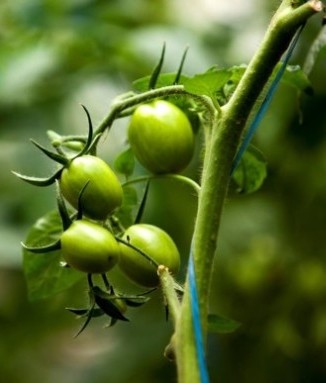
Kithamani tomatoes
Business as un-usual
The climate in Kithimani is dry, but most people have only farming to rely on. Our group members are no exception: 109 of the 138 grow and sell staple crops including maize, beans and other vegetables.
Having been introduced to more modern farming techniques, many will now move from the hand-to-mouth existence of subsistence farming to selling surplus crops. Keeping livestock is also popular. Six of the villagers participating in Hand in Hand’s training have livestock of some sort. Others activities include charcoal production, knitting and running a grocery stall.
The business skills the villagers will learn over the next year, from book-keeping to marketing, will apply no matter their profession. They will know whether they have set prices for their produce at the right level, and if they are making a profit.
Luisah Kilovoo, the oldest Kithimani group member, was one of the first to take the business training and is living proof it is never too late to learn. “Now I know whether I am making a profit or a loss on the chickens and rabbits I keep and the oranges I grow,” she says.
Voices from the village program
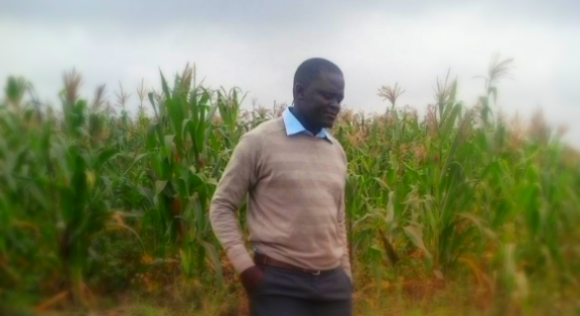
Victor Ablonda |Kithamani village| Machakos county, Kenya
Victor Ablonda (pictured left), one of Hand in Hand’s most experienced Business Relationship Officers in the region, has already spent hours criss-crossing the roads in and around Kithimani to recruit 400 Self-Help Group members for training.
Once Victor is satisfied that the groups are committed to the training, we formally include them in the programme and establish a business training schedule. Within two months, Victor had already mobilised three groups, counting 72 members altogether. The majority of members, 66, are women.
One such group (pictured right) has already started operating a so-called ‘merry-go-round’ savings fund that each member pays into weekly, and which each member can access – with the group’s approval – to help finance a business.
The group looks forward to receiving Hand in Hand business and skills training over the coming weeks and months.
“I know from experience that training the people of Kithimani in business skills will really empower them to see earning opportunities other than farming,” says Victor.
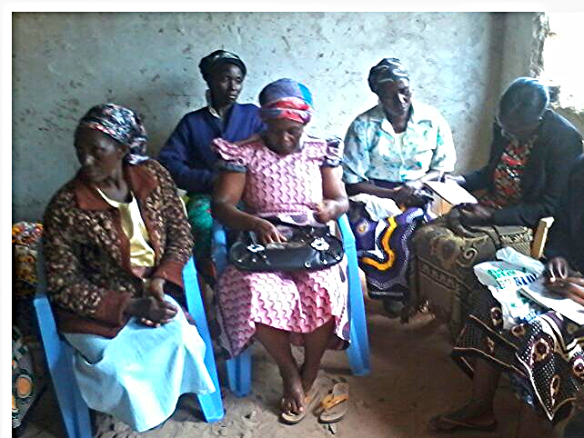
Members of the Kithuluni Farmers Self-Help Group meet to discuss their savings fund | Kithimani |Machakos county, Kenya
Voices from the village program
"Teacher, we were so blinded before. But now, rain or no rain, I will always have an income." Self-Help Group member trained by Victor Ablonda | Machakos province, Kenya
"It feels fantastic to empower rural entrepreneurs in Kenya. Entrepreneurship creates the confidence, leadership and skills required to rise out of poverty. We want to provide such opportunities for the most vulnerable in society." Göran and Anette Bredinger, Founders | Dieden Invest AB
Sponsor a village

Philanthropy Manager
Joe Dyson Philanthropy ManagerTo learn more about how you can sponsor a village please contact Joe Dyson. Joe’s career in charity began at Barnardo’s, where he worked with philanthropists to support the UK’s most vulnerable children. He joined Hand in Hand after developing a keen interest in international development.
jdyson@hihinternational.orgTel: +44 (0)7415 339214

